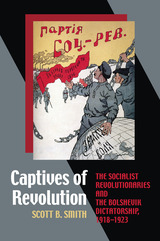
The Socialist Revolutionaries (SRs) were the largest political party in Russia in the crucial revolutionary year of 1917. Heirs to the legacy of the People’s Will movement, the SRs were unabashed proponents of peasant rebellion and revolutionary terror, emphasizing the socialist transformation of the countryside and a democratic system of government as their political goals. They offered a compelling, but still socialist, alternative to the Bolsheviks, yet by the early 1920s their party was shattered and its members were branded as enemies of the revolution. In 1922, the SR leaders became the first fellow socialists to be condemned by the Bolsheviks as “counter-revolutionaries” in the prototypical Soviet show trial.
In Captives of the Revolution, Scott B. Smith presents both a convincing account of the defeat of the SRs and a deeper analysis of the significance of the political dynamics of the Civil War for subsequent Soviet history. Once the SRs decided to openly fight the Bolsheviks in 1918, they faced a series of nearly impossible political dilemmas. At the same time, the Bolsheviks fatally undermined the revolutionary credentials of the SRs by successfully appropriating the rhetoric of class struggle, painting a simplistic picture of Reds versus Whites in the Civil War, a rhetorical dominance that they converted into victory over the SRs and any left-wing alternative to Bolshevik dictatorship. In this narrative, the SRs became a bona fide threat to national security and enemies of the people—a characterization that proved so successful that it became an archetype to be used repeatedly by the Soviet leadership against any political opponents, even those from within the Bolshevik party itself.
In this groundbreaking study, Smith reveals a more complex and nuanced picture of the postrevolutionary struggle for power in Russia than we have ever seen before and demonstrates that the Civil War—and in particular the struggle with the SRs—was the formative experience of the Bolshevik party and the Soviet state.

Vanguard of Nazism is the first full history of the German Free Corps and of its contributions to the rise of Nazism. This dramatic and horrifying story sheds new light on a dark corner of the recent past, and it has an unhappy relevance to neo-Nazist tendencies in Germany today.
The newly established Weimar Republic, defenseless against the Communists, hired groups of volunteer soldiers (the Free Corps) to fight for it. These volunteers—born of the pre–World War I youth movement, nourished on the battlefields of the War, unreconciled to defeat and determined to avenge it—fought for the Republic (which they despised) from Munich to Berlin, from Düsseldorf to the Baltic. When the Republic, in fear, tried to disband them, they went underground until they reappeared in the brown shirts of the Nazis.
The savage spirit, brutal acts, and perverted ideology of the men whom Hermann Goering called “the first soldiers of the Third Reich” stand out in glaring relief in this record. The book is based on contemporary newspaper accounts and government documents, but the story it tells would hardly be credible were it not for the memoirs of the Free Corps fighters themselves, from which Robert G. L. Waite quotes liberally. With this material, Waite is able to show that the Free Corps contributed to Hitler’s Germany powerful political shock troops, labor camps, a youth movement, a well-developed Führer concept, and the basic tenets of National Socialist ideology.
The movement, half a million strong, swept Germany at a time when Hitler was an unknown political agitator. But when Hitler came to power, leaders of the Free Corps emerged as leaders of the Third Reich. Waite lists the names of these men in a valuable appendix to the book, which shows the activities of each man in both movements.
Waite emphasizes and substantiates the thesis that National Socialism really began in the months and years immediately following World War I. Aside from its importance as history, the story of these self-styled Freebooters has all the ingredients of a fantastic adventure tale: intrigues, conspiracies, quick reversals, and sudden death follow each other in dramatic succession.
READERS
Browse our collection.
PUBLISHERS
See BiblioVault's publisher services.
STUDENT SERVICES
Files for college accessibility offices.
UChicago Accessibility Resources
home | accessibility | search | about | contact us
BiblioVault ® 2001 - 2024
The University of Chicago Press









